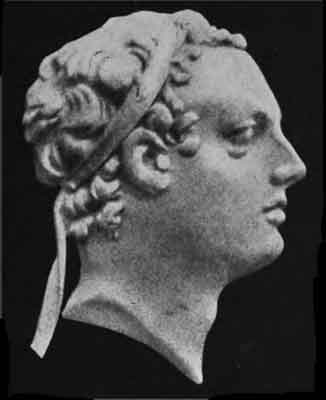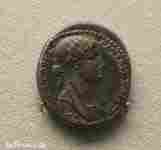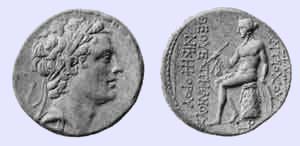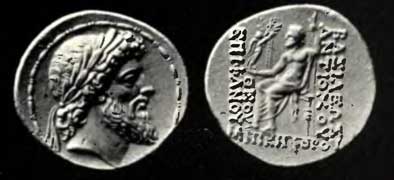.

Antiochus IV Epiphanes, drawing after a coin
Antiochus IV Epiphanes (Αντίοχος Επιφανής, Greek: Manifest)("The Shining One") was a ruler of the Hellenistic Seleucid Empire. He was originally named Mithradates, but renamed Antiochus either upon his ascension or after the death of his elder brother Antiochus (c. 215–-163 BC, reigned 175-–163 BC), was one of the Seleucid emperors, son of Antiochus III the Great and brother of Seleucus IV Philopator.
Antiochus took power after the death of Seleucus Philopator. He had been hostage in Rome following the peace of Apamea in 188 BC but had recently been exchanged for the son and rightful heir of Seleucus IV, the later Demetrius I Soter. Taking advantage of this situation, Antiochus was able to proclaim himself as co-regent with another of Seleucus' sons, the infant Antiochus, whose murder he orchestrated a few years later.
Notable events during his reign include the near-conquest of Egypt, which was halted by the threat of Roman intervention, and the beginning of the Jewish revolt of the Maccabees. He was succeeded by his infant son, Antiochus V Eupator.

Kommagene, Iotape, Wife of Antiochos IV,
Because the guardians of Ptolemy VI of Egypt were demanding the return of Coele-Syria, Antiochus, in 170 BC decided on a preemptive strike and invaded Egypt, conquering all but Alexandria. He then captured Ptolemy agreed to let him continue as King but as his puppet. (This had the advantage of not alarming Rome.) Alexandria thereupon chose Ptolemy's brother Ptolemy Euergetes as King. In Atiochuses absence, the two brothers came to an agreement to rule jointly. Hence in 168 BC Antiochus again invaded and overran all Egypt but Alexandria while his fleet captured Cyprus. Near Alexandria he was met by a Roman envoy who told him that he must at once withdraw from Egypt and Cyprus. Antiochus said he would discuss it with his council, whereupon the envoy drew a line in the sand round him. Were he to step out of the circle, the envoy said, without having first undertaken to withdraw , he would be at war with Rome. Antiochus agreed to withdraw.
In a spirit of revenge he organized an expedition against Jerusalem, which he destroyed, as well as putting vast multitudes of its inhabitants to death in a most cruel manner. From this time the Jews began the war of independence under their Maccabean leaders with marked success, defeating the armies of Antiochus that were sent against them. Enraged at this, Antiochus is said to have marched against them in person, threatening utterly to exterminate the nation; but on the way he was suddenly arrested by the hand of death (164 BC). The exact causes of the Jewish revolt, and of Antiochus' response to it, are uncertain; The Jewish accounts are in The Books of The Maccabees, and the successful revolt commemorated in the Holiday of Hanukkah. . His last years were spent on a campaign against the rising Parthian empire, which seems to have been initially successful but which terminated upon his death.

Coin of Antiochus IV. Reverse shows Apollo seated on an omphalos. The Greek inscription reads ΑΝΤΙΟΧΟΥ ΘΕΟΥ ΕΠΙΦΑΝΟΥ ΝΙΚΗΦΟΡΟΥ (Antiochus, image of God, bearer of victory). [Source]

Antiochus IV Tetradrachm, Zeus Head amd Zeus with Nike.
Text (r) Basileos Antiochou (le) Theou Epiphanous, Below Nikephorou. A copy of the Statue of Zeus by Pheidias was set in a Temple near Antioch by Antiochus IV
The reign of Antiochus was a last period of strength for the empire, but in some way it was fatal; since he was an usurper, and left his infant son Antiochus V Eupator as his successor, devastating dynastic wars followed his death.
Christian theologians traditionally have pointed to the prophecy in the Book of Daniel as foretelling the coming of Antichus Epiphanes.1 2, but there is disagreement on the issue[1].
Seleucid Ruler 175–-163 BC
Preceded by: Seleucus IV
Succeeded by: Antiochus V
| Ancient Greece
Science, Technology , Medicine , Warfare, , Biographies , Life , Cities/Places/Maps , Arts , Literature , Philosophy ,Olympics, Mythology , History , Images Medieval Greece / Byzantine Empire Science, Technology, Arts, , Warfare , Literature, Biographies, Icons, History Modern Greece Cities, Islands, Regions, Fauna/Flora ,Biographies , History , Warfare, Science/Technology, Literature, Music , Arts , Film/Actors , Sport , Fashion --- |
Retrieved from "http://en.wikipedia.org"
All text is available under the terms of the GNU Free Documentation License

